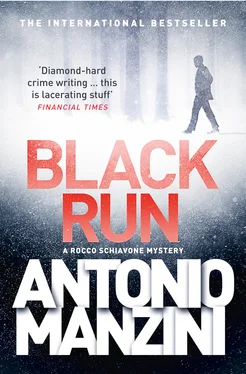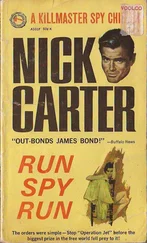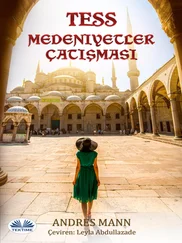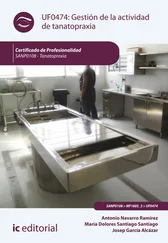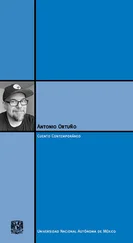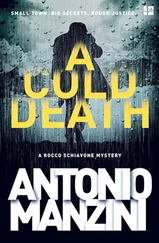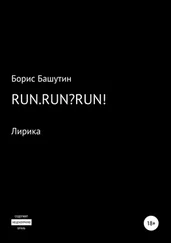“A pair of Clarks desert boots.”
“Are they insulated?”
“No. Which is why I’m telling you to wear a pair of insulated shoes. My feet are like a couple of ice cubes.”
“Then why don’t you get yourself a pair?”
“I can’t stand the things.”
“Well, you do what you like. I’m going to swing by Decathlon and get a pair. So—see you tomorrow?”
“See you tomorrow.”
And Sebastiano hung up the phone.
Rocco dropped his cell phone on his down jacket. If Sebastiano Cecchetti, known to his friends as Seba, was coming to Aosta, then matters were becoming distinctly interesting.
When Rocco walked into police headquarters at 8:15 a.m., Special Agent Michele Deruta walked up to him immediately. He was moving his tiny feet as fast as his two-hundred-plus pounds allowed him, and he was panting like an old steam locomotive. His chin was sweaty and his thinning white hair, combed specially to conceal his bald spot, was glittering, oiled by who-knows-what pomade.
“Dottore?”
Rocco stopped suddenly in the middle of the hallway. “Your face and hair are damp. Why damp, Deruta? Did you stick your face into a barrel of oil?”
Deruta pulled out his handkerchief and tried to dry himself off. “I wouldn’t know, Dottore.”
“But still, you’re damp. Do you take a shower in the morning?”
“Yes, of course.”
“But you don’t dry off.”
“No, it’s just that before coming to work, I help my wife at her bakery.”
Officer Deruta, getting close to retirement age, started talking about his wife’s bakery just outside of town, the work in the predawn hours, the yeast and the flour. Rocco Schiavone paid no attention to a word he said. He just watched his damp, loose lips, his hair streaked with white, and his bovine, bulging eyes.
“What’s surprising,” said the deputy police chief, interrupting his special agent’s monologue, “is not that you work at your wife’s bakery, Deruta. It’s that you have a wife at all—that’s what’s truly extraordinary.”
Deruta fell silent. It wasn’t as if he expected special praise for his daily sacrifice of working a double job, but a kind word, something like “You’re wearing yourself out, Deruta. What a good man you are,” or, “If only there were more people like you.” Instead he got nothing. A scornful lack of consideration was all his superior officer could offer him.
“Aside from your double shift, is there anything important you need to tell me?” asked the deputy police chief.
“The chief of police has already called three times this morning. He needs to speak to the press.”
“So?”
“First he wants to hear from you.”
Rocco nodded and turned away, leaving Deruta there; still, the officer chased after him on his dainty feet. To watch the heft of his 225 pounds bounce along on his size 7½ men’s shoes, you’d expect him to roll headlong across the floor at any moment. “The chief of police isn’t in town, Dottore. There’s no point in you going up to see him. You’ll have to call him.”
Rocco stopped and turned to look at Officer Deruta. “I see. Well, now, listen to me and listen good. Two things. First of all, start getting some exercise and put yourself on a diet. Second: later on, I’ve got an important job for you.” He furrowed his brow and looked Deruta in the eye. “Very important. Can I rely on you? Do you feel up to it?”
Deruta’s eyes opened wide and became even bigger than usual. “Certainly, Dottore!” he said, and flashed him a bright, thirty-two-tooth smile. Actually, a twenty-four-tooth smile, because there were several gaps. “Certainly, Dottor Schiavone. You can trust me blindly!”
“Why don’t you find yourself a dentist!”
“You think?” asked Deruta, covering his mouth with one hand. “Do you know how much they cost? On my salary?”
“Tell your wife to give you the money.”
“That money goes to my daughter, who’s studying in Perugia to be a veterinarian.”
“Ah. I get it. You’re training your own family doctor. Good thinking!” and he finally walked into his office, slamming the door behind him and blocking out the baffled face of the officer, who stood there, still chewing over what the deputy police chief had meant by his last comment.
In his long-ago high school days, Rocco had read that some philosopher, possibly Hegel, had described the newspaper as “the realist’s morning prayer.” But his version of the realist’s morning prayer was to roll a fat joint to put his mind at peace with the world and the fact that he’d been forced to live all this distance from Rome for the past four months. And the knowledge that there was no way to get back there.
Not that he had anything against Aosta. Quite the opposite. It was a lovely city, and the people were all nice and polite. But it wouldn’t have been any different if they’d stationed him in Salerno, or Mantua, or Venice. The end result would be the same. It wasn’t a matter of the destination. What he missed above all was his native city, his existential stomping grounds, his home base.
He pulled the key out from under the framed photograph of Marina on his desk and pulled open the top drawer on the right. Inside sat a wooden box with a dozen handsome fatties, all ready to go. He lit one and, as he twisted the key shut in the drawer lock, took a long, generous drag that went straight to his lungs.
Funny how this small everyday gesture helped to soothe his brain. With the third puff, he gained a sense of lucidity and started planning out his day.
First thing: call the chief of police.
Then the hospital.
And then Nora.
He laid the half-smoked joint down in his ashtray. He was just reaching out for the receiver when the phone started to ring.
“Pronto, sì?”
“Corsi speaking!”
It was the police chief.
“Ah, Dottore, I was just about to call you.”
“That’s what you always say.”
“But this time it’s the truth.”
“Then you’re saying all the other times you were lying to me?”
“Sure.”
“All right, Schiavone, go ahead.”
“We still don’t know a thing. Neither who he was nor how he died.”
“So what am I supposed to tell those guys?”
It wasn’t that the chief of police had forgotten the word. It was just that he never named the city’s crew of print journalists. He always called them “those guys.” As if he weren’t willing to soil his lips with the common noun. He hated them. As far as he was concerned, they were a life form just one step up from the amoeba, the one flat note in the symphony orchestra of creation. That was how he felt about the print journalists. “Those other guys,” television reporters—he didn’t even consider them to be living entities.
That hatred was rooted deep in his personal history. It had been almost eighteen years since his wife left him for an editorialist at La Stampa , and since then Corsi had been waging a senseless crusade against every member of the guild, irrespective of race, religion, or political creed.
“Dottore, that’s what we know. If they would be patient—if the gentlemen of the press would be so good as to patiently await the developments of the investigation … Otherwise, unfortunately, I have nothing to add.”
“Those guys won’t wait. They’re lying in wait, eager to bite me in the ass.”
“That’s what you think, Chief. The press around here loves you,” Rocco said seriously.
“What makes you say that?”
“I hear what people say. They respect you. They need you.”
There was a pause. The police chief was mulling over what his underling had just told him. And Rocco smiled, delighted to go on tangling the threads of the relationship between his boss and “those guys.”
Читать дальше
